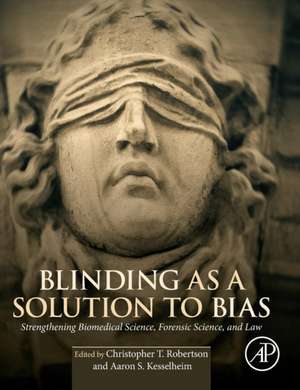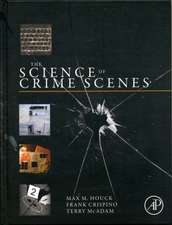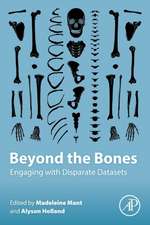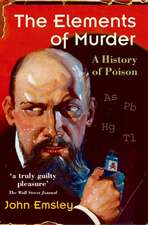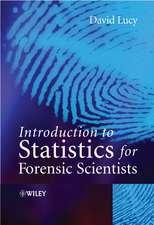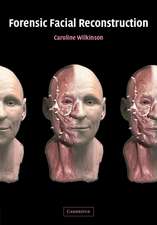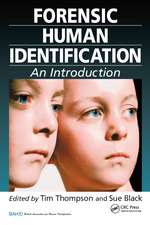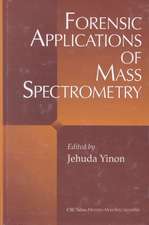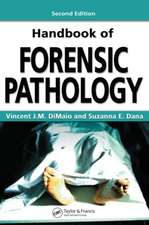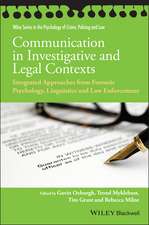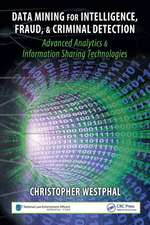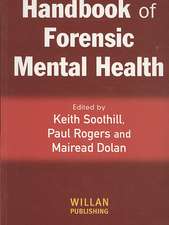Blinding as a Solution to Bias: Strengthening Biomedical Science, Forensic Science, and Law
Editat de Christopher T Robertson, Aaron S Kesselheimen Limba Engleză Hardback – 2 feb 2016
Robertson and Kesselheim bring together a renowned group of interdisciplinary scholars to consider another way to reduce the risk of biased decision-making: blinding. What are the advantages and limitations of blinding? How can we quantify the biases in unblinded research? Can we develop new ways to blind decision-makers? What are the ethical problems with withholding information from decision-makers in the course of blinding? How can blinding be adapted to legal and scientific procedures and in institutions not previously open to this approach? Fundamentally, these sorts of questions—about who needs to know what—open new doors of inquiry for the design of scientific research studies, regulatory institutions, and courts.
The volume surveys the theory, practice, and future of blinding, drawing upon leading authors with a diverse range of methodologies and areas of expertise, including forensic sciences, medicine, law, philosophy, economics, psychology, sociology, and statistics.
- Introduces readers to the primary policy issue this book seeks to address: biased decision-making.
- Provides a focus on blinding as a solution to bias, which has applicability in many domains.
- Traces the development of blinding as a solution to bias, and explores the different ways blinding has been employed.
- Includes case studies to explore particular uses of blinding for statisticians, radiologists, and fingerprint examiners, and whether the jurors and judges who rely upon them will value and understand blinding.
Preț: 451.11 lei
Preț vechi: 490.34 lei
-8% Nou
Puncte Express: 677
Preț estimativ în valută:
86.32€ • 90.37$ • 71.42£
86.32€ • 90.37$ • 71.42£
Carte tipărită la comandă
Livrare economică 29 martie-12 aprilie
Preluare comenzi: 021 569.72.76
Specificații
ISBN-13: 9780128024607
ISBN-10: 0128024607
Pagini: 388
Dimensiuni: 191 x 235 x 25 mm
Greutate: 1 kg
Editura: ELSEVIER SCIENCE
ISBN-10: 0128024607
Pagini: 388
Dimensiuni: 191 x 235 x 25 mm
Greutate: 1 kg
Editura: ELSEVIER SCIENCE
Cuprins
BLINDING AND BIAS
Chapter 1. A Primer on the Psychology of Cognitive Bias (Carla Lindsay MacLean and Itiel Dror)
Chapter 2. Why Blinding? How Blinding? A Theory of Blinding and Its Application to Institutional Corruption (Christopher Robertson)
BIOMEDICAL SCIENCE
Chapter 3. From Trials to Trials: Blinding, Medicine, and Honest Adjudication (Scott H. Podolsky, David S. Jones, and Ted J. Kaptchuk)
Chapter 4. Blinding in Biomedical Research: An Essential Method to Reduce Risk of Bias (Asbjorn Hrobjartsson)
Chapter 5. Blind Peer Review by Academic Journals (Emily A. Largent and Richard T. Snodgrass)
Chapter 6. Clinical Trial Blinding in the Age of Social Media (Paul Wicks)
Chapter 7. The Ethics of Single-Blind Trials in Biomedicine (Franklin G. Miller)
Chapter 8: “Money Blinding as a Solution to Biased Design and Conduct of Scientific Research (Christopher Robertson and Marc A. Rodwin)
FORENSIC SCIENCE: CRIMINAL AND CIVIL
Chapter 9. Determining the Proper Evidentiary Basis for an Expert Opinion: What Do Experts Need to Know and When Do They Know Too Much? (William C. Thompson)
Chapter 10. Minimizing and Leveraging Bias in Forensic Science (Roger Koppl and Dan Krane)
Chapter 11. What Do Statisticians Really Need to Know, and When Do They Need to Know It? (D. James Greiner)
Chapter 12. Using Blind Reviews to Address Biases in Medical Malpractice (Jeffrey D. Robinson)
Chapter 13. Mock Juror and Jury Assessment of Blinded Expert Witnesses (Megan S. Wright, Christopher Robertson, and David V. Yokum)
Chapter 14. Disclosure Discretion and Selection Bias in Blinding of Experts (Christopher Robertson)
BLINDING IN LEGAL INSTITUTIONS
Chapter 15. Why Eyes? Cautionary Tales from Law’s Blindfolded Justice (Judith Resnik and Dennis Curtis)
Chapter 16. A Theory of Anonymity (Jeffery M. Skopek)
Chapter 17. The Cases for and Against Blindfolding the Jury (Shari Seidman Diamond)
Chapter 18. The Compliance Equation: Creating a More Ethical and Equitable Campaign Financing System by Blinding Contributions to Federal Candidates (Bertram Levine and Michael Johnston)
Chapter 19. Blinding Eyewitness Identifications (Brandon Garrett)
Chapter 20. Blind Appointments in Arbitration (Sergio Puig)
Chapter 21. Psychological Obstacles to the Judicial Disqualification Inquiry,and Blinded Review was an Aid (David V. Yokum)
Chapter 22. Masking Information Source Within the Internal Revenue Service (Karie Davis-Nozemack)
Chapter 23. Blinding the Law: The Potential Virtue of Legal Uncertainty (Yuval Feldman and Shahar Lifshitz)
Chapter 1. A Primer on the Psychology of Cognitive Bias (Carla Lindsay MacLean and Itiel Dror)
Chapter 2. Why Blinding? How Blinding? A Theory of Blinding and Its Application to Institutional Corruption (Christopher Robertson)
BIOMEDICAL SCIENCE
Chapter 3. From Trials to Trials: Blinding, Medicine, and Honest Adjudication (Scott H. Podolsky, David S. Jones, and Ted J. Kaptchuk)
Chapter 4. Blinding in Biomedical Research: An Essential Method to Reduce Risk of Bias (Asbjorn Hrobjartsson)
Chapter 5. Blind Peer Review by Academic Journals (Emily A. Largent and Richard T. Snodgrass)
Chapter 6. Clinical Trial Blinding in the Age of Social Media (Paul Wicks)
Chapter 7. The Ethics of Single-Blind Trials in Biomedicine (Franklin G. Miller)
Chapter 8: “Money Blinding as a Solution to Biased Design and Conduct of Scientific Research (Christopher Robertson and Marc A. Rodwin)
FORENSIC SCIENCE: CRIMINAL AND CIVIL
Chapter 9. Determining the Proper Evidentiary Basis for an Expert Opinion: What Do Experts Need to Know and When Do They Know Too Much? (William C. Thompson)
Chapter 10. Minimizing and Leveraging Bias in Forensic Science (Roger Koppl and Dan Krane)
Chapter 11. What Do Statisticians Really Need to Know, and When Do They Need to Know It? (D. James Greiner)
Chapter 12. Using Blind Reviews to Address Biases in Medical Malpractice (Jeffrey D. Robinson)
Chapter 13. Mock Juror and Jury Assessment of Blinded Expert Witnesses (Megan S. Wright, Christopher Robertson, and David V. Yokum)
Chapter 14. Disclosure Discretion and Selection Bias in Blinding of Experts (Christopher Robertson)
BLINDING IN LEGAL INSTITUTIONS
Chapter 15. Why Eyes? Cautionary Tales from Law’s Blindfolded Justice (Judith Resnik and Dennis Curtis)
Chapter 16. A Theory of Anonymity (Jeffery M. Skopek)
Chapter 17. The Cases for and Against Blindfolding the Jury (Shari Seidman Diamond)
Chapter 18. The Compliance Equation: Creating a More Ethical and Equitable Campaign Financing System by Blinding Contributions to Federal Candidates (Bertram Levine and Michael Johnston)
Chapter 19. Blinding Eyewitness Identifications (Brandon Garrett)
Chapter 20. Blind Appointments in Arbitration (Sergio Puig)
Chapter 21. Psychological Obstacles to the Judicial Disqualification Inquiry,and Blinded Review was an Aid (David V. Yokum)
Chapter 22. Masking Information Source Within the Internal Revenue Service (Karie Davis-Nozemack)
Chapter 23. Blinding the Law: The Potential Virtue of Legal Uncertainty (Yuval Feldman and Shahar Lifshitz)
Recenzii
"Since the time of Ben Franklin, scientists have recognized the power of blinding to help us see the world more objectively. This collection of essays explores the complicated psychology of blinding, while making a compelling case that we have yet to fully embrace the power of invisibility." --Peter A. Ubel, University Professor, Fuqua School of Business, Duke University
"Robertson and Kesselheim’s book provides an authoritative look at the practice of blinding and how it can be used to improve our health care and legal systems. It is a wonderful resource for medical students, policymakers, and anyone else interested in studying conflicts of interest and helping address bias in clinical practice and biomedical research." --Jerry Avorn, Professor of Medicine, Harvard Medical School
"This extraordinary collection of scholars takes on in exhaustive detail one of the foundational questions of public policy – under what circumstances are decisions improved by limiting decisionmakers’ access to information. From orchestra auditions and secret ballots to blinded trials and the parole evidence rule, the examples discussed in in this volume’s broad-ranging contributions illuminate when veils of ignorance should be embraced." --Ian Ayres, Professor, Yale Law School
"Robertson and Kesselheim’s book provides an authoritative look at the practice of blinding and how it can be used to improve our health care and legal systems. It is a wonderful resource for medical students, policymakers, and anyone else interested in studying conflicts of interest and helping address bias in clinical practice and biomedical research." --Jerry Avorn, Professor of Medicine, Harvard Medical School
"This extraordinary collection of scholars takes on in exhaustive detail one of the foundational questions of public policy – under what circumstances are decisions improved by limiting decisionmakers’ access to information. From orchestra auditions and secret ballots to blinded trials and the parole evidence rule, the examples discussed in in this volume’s broad-ranging contributions illuminate when veils of ignorance should be embraced." --Ian Ayres, Professor, Yale Law School
